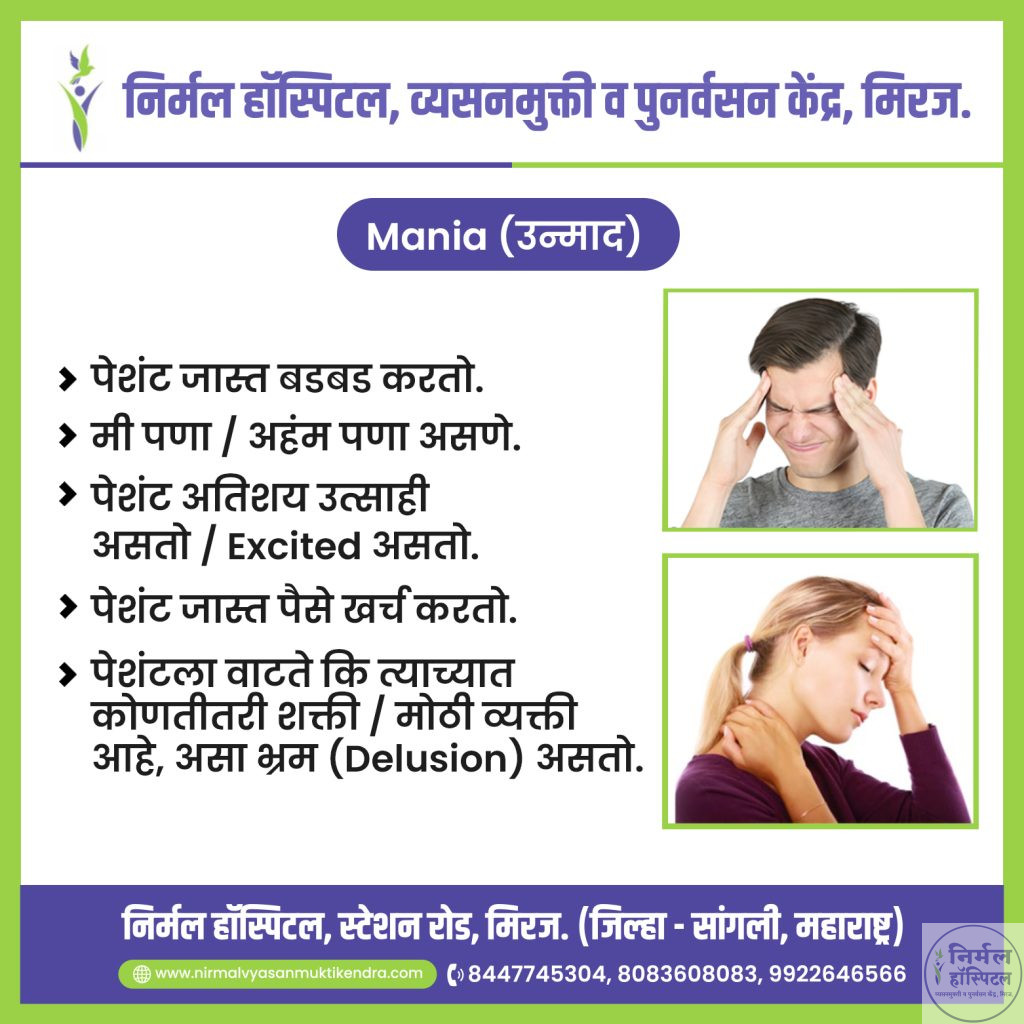उन्माद (Mania)
या आजारामध्ये स्वतः मोठी व्यक्ती आहे असे समजणे, मोठमोठ्या गोष्टी करणे, अनोळखी माणसांशी जास्त बोलणे, जास्त खूष राहणे, अनावश्यक पैसे खर्च करणे, नवनवीन कपडे किंवा वस्तू खरेदी करणे, सामानाची तोड-फोड, नासधूस करणे इत्यादी.
- In this Mania condition patient feels be feels great, talks big things, feels happy, joyful, spending sprees ,some patients becomes overactive / Aggressive, violent with Decreased need of sleep. May get grandiose ideas etc.
- Mania represents a more severe form of abnormally elevated mood than Hypomania
- Patients with Hypomania have insight into their illness.
- Patients with Mania tend not to have insight.
- Patients with Hypomania never have psychotic symptoms (the diagnosis would become Mania)
- Patients with Mania may or may not have psychotic symptoms

CLINICAL FEATURES OF MANIA
- Elevated or irritable mood that is clearly abnormal
- Severe interference to personal functioning
- Increased activity/ restlessness
- Increased energy
- Increased talkativeness (‘pressure of speech’)
- Flight of ideas/ ‘racing thoughts’
- Disinhibition / inappropriate behaviour (including sexual)
- Grandiosity/increased self-esteem
- Decreased (need for) sleep
- Irresponsible behaviour: Over-spending, starting unrealistic enterprises
- Increased perceptual sensitivity: hyperacusis, seeing colors as vivid
CLINICAL FEATURES OF HYPOMANIA
- Elevated or irritable mood that is clearly abnormal for the person
- Increased activity/ restlessness
- Increased energy
- Increased talkativeness
- Decreased concentration / easily distractible
- Decreased (need for) sleep
- Over-familiarity/increased sociability
PSYCHOTIC SYMPTOMS IN MANIA
- Both delusions and hallucinations can occur
- Mood-congruent psychotic symptoms:
- Grandiose delusions
- Voices telling the individual that he/she has superhuman powers
- Mood-incongruent psychotic symptoms:
- Delusions of reference or persecution
- Voices speaking about affectively neutral topics
- (Psychotic symptoms do not occur in Hypomania)
MANAGEMENT OF MANIA/ HYPOMANIA
- If patient was being treated for depression:
- Stop anti-depressant
- First-line treatment (either one of the following):
- Oral atypical antipsychotic
- Divalproex Sodium
- Lithium
- (Carbamazepine)
If needed :
- Short-term benzodiazepine (oral or IM)
- Short-term hypnotic
- If patient responds well to a single first-line drug: Continue as maintenance treatment
- If patient does not respond well/ develops major side-effects to the drug: Change to another first-line drug
- If patient responds partially to a single first-line drug: Add a second first-line drug, (For severe, treatment-resistant mania: ECT may be an option)
For More Information Please Click Here
For More Information About Treatment Please Click Here









Leave a Reply